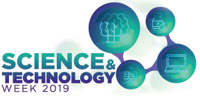
  On Tuesday, May 21, there was a headline in one of our national newspapers that said, “Carmona calls on UWI to tackle water problem”. I was most pleased to see it. On Tuesday, May 21, there was a headline in one of our national newspapers that said, “Carmona calls on UWI to tackle water problem”. I was most pleased to see it.
The article was referring to an address given by Justice Anthony Carmona, former President of Trinidad and Tobago. He was speaking at the launch of our Faculty of Science and Technology’s “Science and Technology Week 2019”, and it was a fiery presentation indeed. Justice Carmona spoke passionately about the challenges our republic and region face due to environmental degradation and climate change. He spoke about the difficulties citizens face finding employment. He painted a stark picture. But it was far from a hopeless picture.
Indeed, Justice Carmona spent almost as much time highlighting the good works of non-governmental organisations, schools, individuals and The UWI. Most importantly, he stressed the critical role of The UWI in solving these challenges. That is why I was grateful to see his call for the University to contribute to the alleviation of the current water shortage woes.
For several years now, the energy on both the St Augustine Campus and the regional University itself has been one of self-assessment and improvement. You can see two illustrations of this focus in this very issue of UWI Today, through the interview with Sir Dennis Byron, Chair of the Chancellor’s Commission on Governance and the report on the 2019 University Council meeting.
This energy for continuous improvement emanates from the top of the UWI hierarchy, has motivated our current Triple-A Strategic Plan and is also the mindset embedded in the institution in every campus and outpost. And well it should be, since one pillar of effectiveness is to focus your efforts where they are most able to produce results
However, at the end, if we truly want to make the region better - economically, socially, politically and environmentally - it must be a collective effort. Even if collective action simply means accepting the support that the University can provide.
We have heard the criticism of The UWI that it can be an “ivory tower”, disconnected from the society and its needs. And there is some truth to the notion that we could be better in directly addressing the needs of society. This is one of our strategic imperatives and a personal goal of mine. But the question has to be asked, how receptive are the key influencers and policymakers to our interventions? When transformation is needed, when problems need to be solved, do they, like Justice Carmona, call on UWI? And when we approach them with solutions are they open to their implementation?
Truthfully, there have always been many scholars and students with the knowledge and ambition to make society better. Right now, in every faculty, unit and laboratory on this campus, there are many examples where workable solutions have been devised to a host of problems. The average citizen would be shocked at what has been developed but remains unknown to the wider society.
Part of improving the University therefore includes continued awareness of what we have accomplished and continue to accomplish. That is why activities such as Science and Technology Week are so important. The theme of this inaugural event is “Science in Communities”, emphasising the Faculty’s community-focused, impactful work.
FST Week exhibited our scientists’ and student scientists’ work in climate change, green technology, environmental protection, data application, information technology, health, wellness, and pharmaceuticals. So much amazing work by driven people, many of them still very young. This week-long event is an outstanding revelation of the value UWI can bring to the society.
We at The UWI will continue to improve, honing our focus on finding ways to make a lasting and impactful contribution to the development of Caribbean society. We will continue to forge stronger links with governments and industries for the region’s benefit. We will tell our stories so that people better understand the work and taking place on campus. In return, when moments of difficulty or opportunity arise we ask that you call on us. Call our name.
Professor Brian Copeland
Pro Vice-Chancellor and Principal
EDITORIAL TEAM
Campus Principal: Professor Brian Copeland
Director of Marketing and Communications (Ag): Mrs Wynell Gregorio
Editor (Ag): Joel Henry (Email:joel.henry@sta.uwi.edu)
Contact us:
The UWI Marketing and Communications Office
Tel: (868) 662-2002 exts. 82013, 83997
Email: uwitoday@sta.uwi.edu
|





